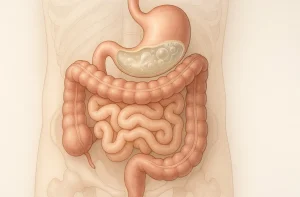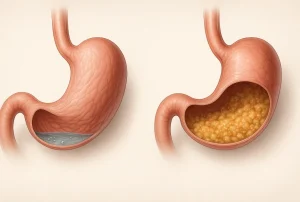Have you ever sat in a quiet room, only for your stomach to break the silence with a deep rumble? It is a sound almost everyone has experienced, yet few truly understand. Why does the stomach growl so audibly when hunger strikes?
What does this noise reveal about the body’s inner workings? Far from being an embarrassing inconvenience, stomach growling is a fascinating biological process that reflects how the digestive system prepares itself for nourishment.
What Causes the Stomach to Make Rumbling Noises?

The noises often described as stomach growls are known medically as borborygmi. These sounds originate in the gastrointestinal tract and occur due to the rhythmic contraction of the stomach and intestinal muscles. This action, called peristalsis, pushes food, liquid, and gas through the digestive system.
As the walls of the stomach and intestines squeeze and relax, they create pressure that shifts the contents inside. Air pockets and fluid are moved around, and this combination produces vibrations. When amplified within the hollow spaces of the digestive system, these vibrations become audible rumbles.
It is useful to think of the digestive tract like a system of pipes. Just as air bubbles and liquid moving together create gurgles in plumbing, the mixture of fluid and gas in the intestines produces noises as it travels along.
These sounds are not only normal but also essential for efficient digestion, as they signal that the system is working continuously.
How Does Hunger Trigger Stomach Growling?
Hunger-induced growling is driven by a fascinating interaction between the stomach, intestines, brain, and hormones. After several hours without food, the body initiates a process designed to prepare for the intake of nourishment.
At the centre of this process is a hormone called ghrelin. Produced mainly in the stomach, ghrelin is released into the bloodstream when the digestive tract is empty. It communicates with the brain to stimulate appetite and, importantly, triggers contractions in the muscles of the stomach and intestines.
These muscle movements are not random. They are part of peristalsis, which continues whether or not food is present. When the tract is empty, however, the contractions move mostly gas and digestive fluids, producing louder sounds than usual. This is why stomach growling often coincides with hunger.
The body is essentially “priming” itself to receive food, and the audible rumbling acts as both preparation and a signal that it is time to eat.
This process is not unique to humans. Animals display similar hunger cues, with digestive activity increasing before feeding times. The growl is part of a universal biological rhythm that ensures living beings replenish energy at the right intervals.
Why Is Stomach Growling Louder on an Empty Stomach?

Many people notice that stomach noises are far more obvious when they are hungry compared to when they have recently eaten. This difference lies in how food, or the absence of it, affects sound transmission.
When the stomach and intestines contain food, the mixture of solids and semi-solids muffles the vibrations created by muscle contractions.
The presence of material dampens the resonance, making the noises quieter or less noticeable. In contrast, an empty digestive tract contains mainly air and liquid. These less dense substances act as amplifiers, allowing sounds to travel more clearly.
A useful analogy is comparing an empty bottle to a full one. When tapped, an empty bottle produces a loud, hollow echo, whereas a filled bottle produces a duller sound. The digestive tract behaves in a similar way. On an empty stomach, contractions reverberate more strongly, making the rumbles unmistakable.
This explains why people often experience particularly noticeable growling before lunchtime or in long meetings where breakfast has long been digested.
What Is the Purpose of Stomach Growling?
It may feel inconvenient when the stomach growls in public, but this phenomenon serves an important biological role. The noises act as an internal signal that the body is ready for food. They are a built-in reminder system to refuel before energy levels run low.
On an evolutionary level, stomach growling functioned as a survival mechanism. Our ancestors relied on such signals to know when to seek food in order to maintain strength and alertness. Without these cues, it would have been easier to overlook the body’s nutritional needs, potentially reducing chances of survival.
From a modern perspective, stomach growling can be seen as part of the body’s efficient communication system. For example, a person working long hours without eating may begin to feel tired or unfocused.
At the same time, their stomach begins to growl, reinforcing the body’s demand for nourishment. The sound is therefore not just noise but a vital cue for maintaining balance and wellbeing.
Does the Stomach Growl Only When Hungry?
It is a common misconception that growling is exclusively a sign of hunger. While hunger makes the sounds more noticeable, the digestive system continues to create noises throughout the day regardless of whether a person has eaten recently.
After meals, peristalsis remains active as food is broken down into smaller components for absorption. During this process, the movement of gas and liquid alongside the food produces similar rumbling sounds, though often at a lower volume.
Some people also notice stomach growling at night. This occurs because digestion does not stop during sleep. While the body rests, the digestive tract continues to contract and shift contents, sometimes creating noises that become apparent in a quiet environment.
Normal growling should not be confused with problematic symptoms. If the noises are accompanied by bloating, abdominal pain, or changes in bowel movements, they may indicate an underlying condition.
Can Stomach Growling Indicate a Health Problem?

Although stomach growling is usually harmless, there are instances where persistent or unusually loud noises signal something more significant. Certain digestive conditions can increase the frequency or intensity of borborygmi.
Irritable Bowel Syndrome (IBS) is one such condition. The irregular contractions associated with IBS often produce louder or more frequent growls, sometimes accompanied by discomfort.
Similarly, lactose intolerance can lead to excessive rumbling. When lactose is not properly digested, it ferments in the intestines, producing gas and increasing noise.
Other malabsorption issues, such as coeliac disease, can also amplify digestive activity. In these cases, the growling may be paired with diarrhoea, bloating, or nutrient deficiencies.
If someone experiences continuous growling alongside unexplained weight loss, severe pain, or digestive distress, consulting a healthcare professional is advisable. These symptoms may suggest that the noises are not simply a sign of hunger but part of a larger health concern.
How Can You Reduce or Prevent Stomach Growling?
Completely stopping digestive sounds is impossible, as they are a natural function of the body. However, their frequency and intensity can be managed through dietary and lifestyle choices.
Eating meals at regular intervals prevents the stomach from becoming completely empty for extended periods, thereby reducing hunger growls. Staying hydrated is equally important, as water supports smooth digestion and helps reduce the resonance of gas.
The types of foods consumed also matter. Balanced meals containing protein, fibre, and healthy fats slow digestion and maintain steady energy levels, minimising sudden hunger signals. By contrast, fizzy drinks and certain foods that promote gas production, such as beans and cabbage, may increase rumbling.
Stress management is another factor. The connection between the brain and gut means that anxiety can trigger increased contractions, amplifying noises. Techniques such as deep breathing, mindfulness, or regular exercise may help reduce stress-induced stomach growling.
What Should People Understand About Stomach Noises?
Stomach growling is not a cause for alarm but a natural and healthy part of digestion. It reflects the body’s constant activity in processing food, regulating energy, and preparing for nourishment.
Understanding the difference between normal digestive sounds and those that indicate a problem is essential. Occasional rumbling when hungry, after eating, or at night is entirely normal. Persistent or painful growling, however, warrants medical attention.
Rather than being embarrassed by these noises, individuals should recognise them as evidence of the body’s remarkable efficiency. Each growl represents the seamless coordination between hormones, muscles, and the brain that keeps the body functioning smoothly.
Comparing Stomach Growling in Different Situations
| Situation | Cause of Growling | Typical Experience |
| Hunger growling | Ghrelin release, peristalsis of gas and liquid | Noticeable rumbles before meals |
| After eating | Digestion and breakdown of food in intestines | Softer gurgling during digestion |
| Empty stomach | Amplified sounds due to lack of food muffling noise | Loud, echo-like growling |
| At night | Ongoing peristalsis while body rests | Occasional noises in quiet settings |
| Digestive conditions | IBS, lactose intolerance, malabsorption | Persistent or disruptive growling |
Frequently Asked Questions
Why does the stomach growl even after food has been eaten?
Stomach noises continue after eating because digestion remains active. The intestines still move food, liquid, and gas, which produces gurgling sounds.
Can drinking water reduce stomach growling?
Yes. Water can help by partially filling the stomach, aiding digestion, and dampening the resonance of gas in the intestines.
Is it normal for the stomach to growl during sleep?
Yes. Digestion does not stop at night, and peristalsis continues, which can lead to audible growling in quiet environments.
Does stress really make the stomach growl louder?
Stress affects the brain – gut connection, often stimulating stronger or more frequent intestinal contractions, making noises more noticeable.
Should someone be worried if their stomach growls a lot?
Occasional growling is normal. If it is persistent and accompanied by pain, bloating, diarrhoea, or weight loss, it may be worth consulting a doctor.
Are hunger growls different from digestion noises?
Yes. Hunger growls are usually louder because the stomach is emptier, while digestion noises after meals tend to be softer.
Which foods make stomach growling worse?
Gas-producing foods such as beans, broccoli, onions, and fizzy drinks can increase digestive sounds by raising gas levels in the intestines.






